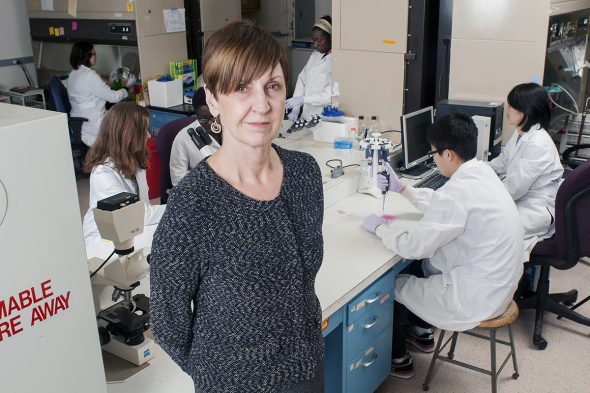An ‘outstanding’ role model for female scientists

Judy Bolton began her career in research but shifted focus to administration. “I like putting groups of people together and seeing if they can come up with a new botanical center,” she says. Photo: Joshua Clark/UIC Photo Services
Judy Bolton is the only female head of a basic science department at UIC.
It’s a role that she doesn’t take lightly, serving as an outstanding mentor for female scientists on campus, says her former protégé and now colleague, Joanna Burdette.
“Judy Bolton is the type of mentor who constantly provided the support and resources that allowed me to flourish as a young scientist,” said Burdette, associate professor of medicinal chemistry and pharmacognosy.
“Her support never waivered. She is tireless in her pursuit of training those she mentors to be better writers, premier researchers and to form collaborations to move the field forward.”
Burdette was one of several UIC faculty members to nominate Bolton as the 2013 Woman of the Year.
The award, established in 1992, recognizes a UIC woman as a role model and supporter of issues affecting women on campus.
Bolton will be honored by the Chancellor’s Committee on the Status of Women at a recognition ceremony from 11:30 a.m. to 1:30 p.m. Tuesday in Thompson Room A and B, Student Center West.
Bolton began her career at UIC 20 years ago as an assistant professor in the College of Pharmacy, progressing to tenured professor in 2002 and head of medicinal chemistry and pharmacognosy in 2005.
“It’s very nice to be in a multidisciplinary department, which has allowed me to be quite successful in my research areas,” she said.
“I’ve tried to maintain that multidisciplinary environment as department head by looking at the types of people we hire — to always have that really nice mix of people who can collaborate together to work on not only our one-time grants, but also large center grants.”
Bolton’s research focuses on women’s health, primarily health in postmenopausal women. She studies the mechanisms of hormonal carcinogenesis in breast cancer and natural alternatives, such as botanicals, to hormonal replacement therapy in menopausal women.
“I’m interested in the reason why women who are taking hormone replacement therapy are at an increased risk of breast and endometrial cancer, which are hormone-dependent cancers,” she said.
Her research is part of the UIC Botanical Center, formed in 1999 to study the effectiveness of dietary supplements and botanicals.
Many women turned to botanicals to treat menopausal symptoms after several studies in 2002 showed that hormone replacement therapies could be linked to an increased risk of breast cancer, Bolton said.
“Women were running away in droves but they needed something to deal with night sweats and hot flashes in particular,” she said.
“Botanicals exploded. The problem is, there’s no regulation of botanicals so there really isn’t the scientific evidence that these botanicals have efficacy.
“Our main goal is to look at efficacy issues, safety issues and potential benefits.”
Though her plate is full with administrative duties, Bolton continues to teach pharmacy students.
“Teaching is still a very important part of my job,” she said.
Jerry Bauman, dean of the College of Pharmacy, praised Bolton as an exceptional researcher and mentor.
“She is an outstanding medicinal chemist and role model whose research program has focused on women’s health since her hire in 1994,” Bauman said. “She has also been instrumental in mentoring the careers of women staff professionals, undergraduate students, pharmacy students, graduate students, research assistant professors and tenure-track faculty members.”
Bolton’s advice for women interested in academic careers: find a life-work balance.
“It’s a difficult thing, trying to find that ideal balance,” she said. “An academic career is a very rewarding career, but it is a difficult one. It requires late hours and a lot of responsibility.
“As a principal investigator, you have additional pressure to publish and obtain funding that you wouldn’t have in industry jobs.”
Bolton began her career on a scientific track but later shifted her focus to becoming an effective administrator.
“I started thinking away from my own research program and thinking more about what does the department need,” she said. “How do we hire the best people, find better space, better instruments?
“I like putting groups of people together and seeing if they can come up with a new botanical center or get a new expensive piece of equipment.”
Her department is often in the top 10 at UIC for National Institutes of Health funding.
“Almost everyone in our department has some sort of funding, which is unusual,” she said. “The national funding rate for departments is 10 to 15 percent. One of the reasons we’ve been very successful is that we’re multidisciplinary and very good at collaborating.
“The people in this department have a lot of respect for one another and know they can walk down the hallway and talk with one of their colleagues about research problems and know that at the end of the talk, they may have another idea for a successful research project.”
Originally from Canada, Bolton travels there at least once a year to visit her father, who lives in Edmonton, Alberta.
She also takes at least one biking trip per year with friends.
“This year, we’re riding from Charleston to Savanna,” she said. “We rode in France in August, and we’ve been to Ireland, Arizona and other places. I really enjoy doing it.”
